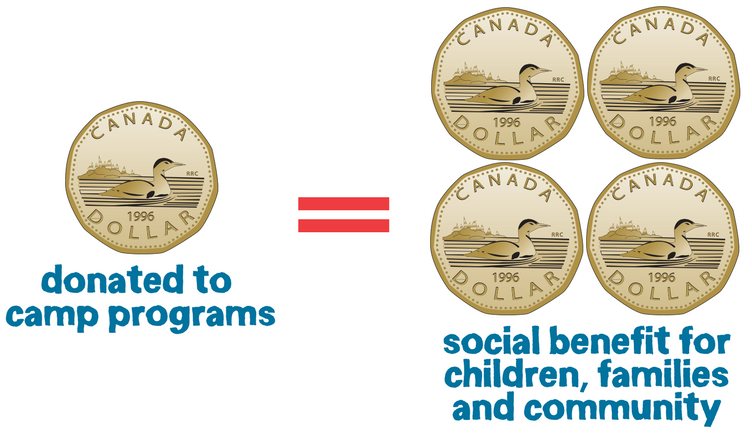Research reveals camp has a 4:1 social return on investment
In an independent study called Social Return on Investment: A New Approach to Understanding and Advocating for Value in Healthcare, University of Calgary researcher Dr. Catherine Laing explored the social return on investment of our SunMaker cancer camp and our Teen Leadership Program. The SROI methodology she employed is a principles-based method, developed and standardized by Social Value UK to measure value, or return on investment, beyond monetary outcomes. It measures the impact of change in social or emotional terms, i.e., quality of life, self-confidence. In the 2017 study, Laing determined that Kids Cancer Care’s SunMaker camp program offers a 4-to-1 social return on investment, meaning that for every dollar invested in our camp programs, the children, families and community at large receive a four-dollar return in social benefit. Her research on the Teen Leadership Program revealed a 2-to-1 social return on investment.

"Camp cracks the shell of fear around parents of children with cancer, allowing the light, the gratitude, to get in, and to help unlock emotions that may, perhaps, have been locked away from the moment of diagnosis." - Dr. Catherine Laing
Research reveals the healing power of camp
An independent study conducted by University of Calgary researcher Dr. Catherine Laing reveals that camp plays a vital role in the healing and recovery of children and their families. Far from a luxury, cancer camp should be considered a psychological intervention for children and families. Conducted over a two-year period, Laing’s research reveals that cancer camp helps children and families in three keys ways, by helping them to:
-
Find acceptance and belonging at a time when forced isolation and harsh medical treatments leave kids with cancer feeling estranged from their peers;
-
Understand their loss and grief in a new light, as something to be lived rather than conquered; and
-
Make sense of their traumatic experiences through storytelling, bonding and sharing with others in similar circumstances.
Laing’s study also exposes one of the less visible fallouts of children’s cancer – the long-term psychological and social effects, similar to post-traumatic stress. While medical professionals address the complex physical needs of children with cancer, camp addresses their emotional and social needs. “Like war, there are physical wounds from childhood cancer, but sometimes, more importantly, there are psychological wounds that never go away,” says Laing. “Curing cancer is just half the battle.”
